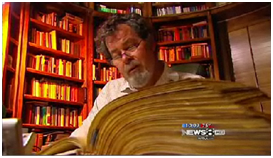I would like to point everyone to a very interesting and informative interview with Dr. Darrell Bock that was recently conducted by Midlands Bible College. He discusses a variety of topics and it is very enjoyable to read. Here is an excerpt:
A short while ago, you wrote widely on matters relating to the DaVinci Code. Is this subject something that you intend to keep at the top of your agenda?
Well, not the DaVinci Code, but I do plan to keep writing in areas where the culture interacts with the Jesus and the Bible. There are so many crazy ideas out there. I distinguish between Christianity, where Jesus is unique and Messiah versus Jesusanity, where Jesus is just a great religious teacher but he is not Messiah nor unique. I will continue to write about the difference and the issues tied to that discussion.
What impact, long-term, do you think the DaVinci Code and similar works will have on the general public perception of the historical Jesus? In other words, do you think the negative effect of these works will be short lived?
It actually is that the DaVinci Code reflects issues that have been in the public square and now, popularized, reflect how many people are coming to see Christianity as a political creation of Constantine that has little, if anything, to do with the historical Jesus. Now Constantine did have a tremendous impact on Christianity, but the theology of the church long predates him as does the church’s view of Jesus, as that is rooted in the experience of the disciples and Jesus’ own teaching. But fighting the impression made by this other story that now shows up in novels and TV specials on Jesus and Christianity is going to be an ongoing task for the church—and many in the church have no idea how to respond to such claims. They sense these alternative ideas are wrong but do not know what to say when “experts” or books say otherwise. Thus the church needs to do a better job of instructing its own on such idea.
For Christians who want to know more about this, there any other books or resources that he would recommend?
There are dozens of books in the DaVinci Code. However there are very few on the early history of Christianity that deal with these issues. Among those that exist are my The Missing Gospels: Unearthing the Truth behind Alternative Christianities; Craig Evans’ Fabricating Jesus; Dan Wallace and two others have Reinventing Jesus. My blog at www.bible.org/bock also discusses these issues now and again. (Read More…)



